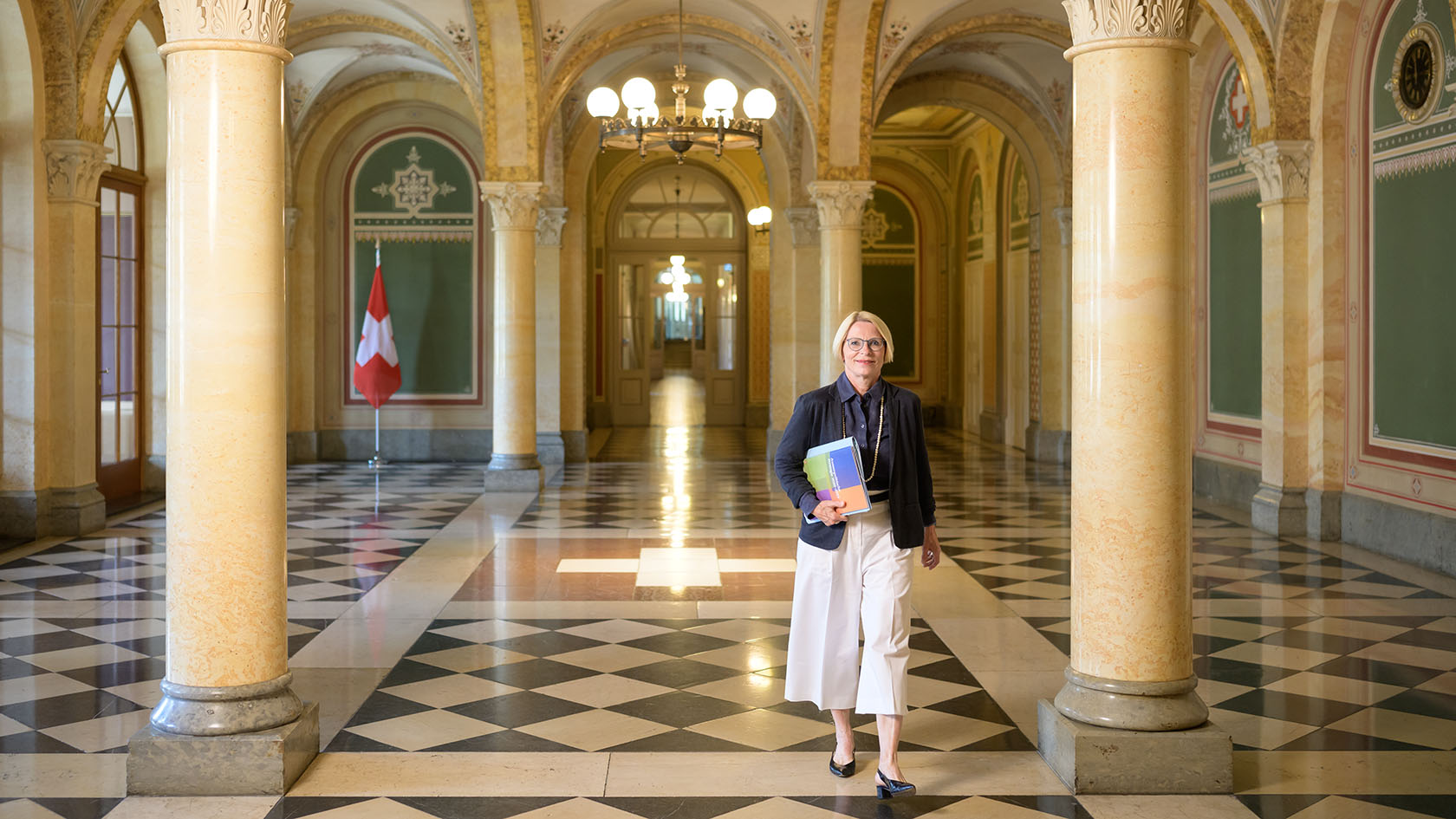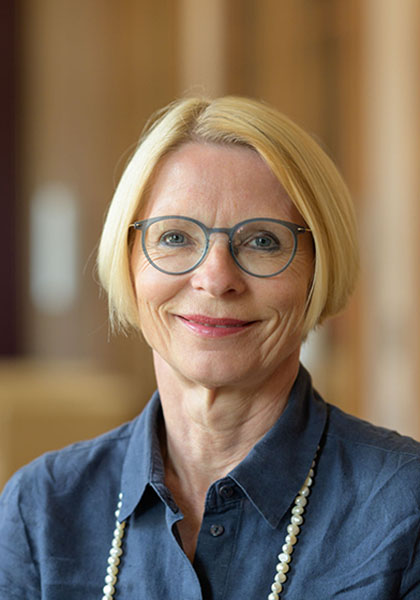In Service of Country

Soft-carpeted stairs take us to the State Secretary’s second-floor office in the west wing of the Federal Palace in Bern. Amid this history-laden setting, we enter an imposing space with high ceilings and sparse furnishings: white USM Haller sideboards, a round conference table, a Le Corbusier lithograph on the wall, and a large-format political map of the world – as well as the obligatory Swiss flag by the desk. When Livia Leu took over this office in 2021 as the new head of the State Secretariat of the Federal Department of Foreign Affairs (FDFA), the first thing she did was bring in space and light. First to go were the black bookcases.
As light and airy as the most powerful female in the Swiss federal administration has made the decor in her Bern control center, as weighty and sensitive are the issues that cross her desk. Her dual role as State Secretary and chief negotiator in talks with the European Union brings challenges on a broad front. She’s responsible for the implementation and ongoing development of the foreign policy defined by the Federal Council and, in parallel, for bilateral relations with the EU. Following the conclusion of negotiations on an institutional framework agreement in 2021, since March 2022 she has been conducting important exploratory talks with the EU on the basis of a new proposed package – and is obviously getting results. Under her leadership, the Gordian knot with the European Union seems to be slowly unravelling, meaning she’s probably achieved more on the European dossier than her predecessors.
In addition to the exploratory talks with the EU, the war on Ukraine is demanding Leu’s full attention. Since February 2022, under her responsibility the State Secretariat has been coordinating political positions and measures to support Ukraine. And as if that weren’t enough crisis and woe, in the past three years there have also been three embassy evacuations to deal with: Kabul and Khartoum as well as Kyiv. That’s a “record” that worries Livia Leu: “The world has got more difficult.”
Bound for Berlin
Switzerland’s highest-ranking diplomat, with her dark blue jacket, long pearl necklace, neat blond pageboy cut and powder-blue glasses, gives a friendly, practiced welcome. Despite her crowded agenda, the 62-year-old UZH alumna is ready to share details about her life. The timing is appropriate, as she’s about to make a career change. At her request, she’s stepping down as State Secretary and chief negotiator in the talks with the EU. “The talks with the EU have been relaunched. My successor will continue them in October. Besides, as a result of the exploratory talks, the Federal Council adopted key parameters for a negotiating mandate at the end of June,” explains Leu. At the beginning of November, she will go to Berlin as ambassador. In the German capital, she will be responsible for cultivating political, economic, cultural and scientific relations with Switzerland’s northerly neighbor and most important trading partner. It’s one of the most coveted diplomatic posts there is. Her new workplace is right next to the German Chancellery on the Spreebogen. How did she make it to this point?
Born in 1961, she grew up in a hotelier’s family in the ski resort of Arosa. Against the picturesque backdrop of Lake Obersee and the Erzhorn mountain, even as a child she was able to get an idea of the wider world. International guests from all walks of life come here to enjoy the Swiss Alps. Her father, already a hotel industry legend during his lifetime, was the charismatic host running the luxurious Hotel Kulm. Livia Leu’s diplomatic skills in dealing with demanding guests are something she learned from her parents on a daily basis. So what could have been more natural than to enter the family business?
At home on the international stage
“My parents had a similar life path planned for me,” the diplomat says. But instead of going to hotel management school in Lausanne like her mother and father and entering the high-end hotel business, after graduating from high school Leu decided to study at university. She was looking for an applied, practical field of study that would enable her to do something with her life. In the mid-1980s, she enrolled in law at the University of Zurich, rushed through her studies and was admitted to the bar, even though she already knew at that point that paragraphs would not be her purpose in life. “But it was important to me to have a profession as well as just a degree, a kind of life insurance policy.”
During her year as an articled clerk, first at the court and then in a law firm, the freshly graduated lawyer missed the international angle, the wide world, and perhaps also the exotic flair. In 1989, after passing the aptitude test, she joined the diplomatic service of the FDFA and was deployed as an intern in Bern, Paris and Geneva. It soon became clear that she was cut out for the world of diplomacy. “As a hotelier’s daughter I learned from an early age what hospitality means and how to handle international contacts.” Another thing that helped her cope with the new, often challenging tasks was a skill she acquired in law school: structured thinking and a systematic approach to problems. “This mental training has benefited me in all my posts,” believes Leu.

The world has got more difficult.
A quick review of the top diplomat’s career can almost leave you feeling dizzy. Her stations in the diplomatic service have included the Swiss Mission to the United Nations in New York and the Swiss embassies in Cairo, Tehran and Paris. In between, she has held various positions in Bern, including as head of the Africa/Middle East political division and Federal Council delegate for trade agreements. The years back in her home country have been particularly important for the well-being of her family, especially her two sons.
Leu once described her time in Iran as the most intense four years of her diplomatic career. From 2009 to 2013, she served as ambassador representing the interests of Switzerland and the United States in the ultraconservative country. Despite all the criticism of things like human rights violations, she was impressed by Iranian hospitality, the good education given to women, and the openness of the people. Her clear, authoritative manner opened many doors for her, especially as a woman, that might have remained closed to other diplomats.
Arm in arm with Hillary Clinton
Her term in office included the Iranian presidential elections, which were accompanied by unrest, the so-called Green Revolution, and the imprisonment of three Americans. They were alleged to have crossed the Iranian border on a hike in the Kurdish part of Iraq and were subsequently arrested. Two years later, after countless interventions, Leu finally succeeded in getting the hikers released. In 2013, she was honored in Washington with the Common Ground Award for her diplomatic services in Iran. A photo of her posing arm in arm with then Secretary of State Hillary Clinton documents the United States’ gratitude and has a place of honor in her Bern office.
The experienced diplomat is keen to paint a realistic picture of her professional life in the service of Switzerland. After all, anyone who aspires to a diplomatic career isn’t just choosing a job, but a whole way of life. You have to settle in at a new destination every few years. According to Leu, aspiring diplomats should be aware that they’re working for the res publica, for the state. She points out that they ultimately represent their home country’s political course and the decisions of the Federal Council. Basically, it helps to be curious and open-minded, as well as having excellent communication skills and a great interest in world politics. Diplomacy, emphasizes the State Secretary, is about much more than representation and cultivated small talk: “In my capacity as a Swiss diplomat, I have to be able to be friendly but tough when it comes to representing the interests of my home country.” Succeeding in this, she says, requires extensive knowledge and regular discussions with government representatives and stakeholders from business, science, culture and industry.
In this context, another personal mission comes to her mind: “In my assignments abroad, I’ve always been mindful of showing that Switzerland is more than a country of cows, chocolate and watches. These days, Switzerland is above all a country of ideas and a world leader in innovation and competitiveness.” It’s okay for a diplomat to be proud of her country.